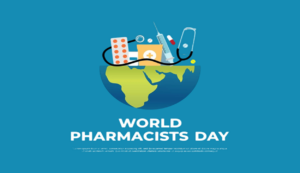World Pharmacist Day: The theme of 2024 is ‘Meeting global health needs’
World Pharmacist Day: In 2009, the International Pharmaceutical Federation (FIP) celebrated World Pharmacist Day on September 25, the anniversary of the organization’s inception.

FIP chooses a topic to commemorate this day every year. “Meeting Global Health Needs” is the subject for 2024, and it emphasizes the vital role that pharmacists play in the global health system. The first World Pharmacist Day celebration in India took place in 2013 at the Siri Fort Auditorium in New Delhi. The event was opened by the previous Kerala chief secretary, Dr. Viswas Mehta IAS. I’m proud to have said that I spoke for Kerala at the first meeting.
This article looks at the topics covered in pharmacy courses in an attempt to analyze this year’s theme.
Indian pharmacy education
Mahadeva Lal Schroff, dubbed the “Father of Pharmacy Education in India,” was regarded as the nation’s first pharmacist.
The Portuguese founded the first pharmacy college in Asia in Goa in 1842. But in 1932, Schroff was the one who established the Banaras Hindu University’s three-year B.Pharm program.

The same institution also created the College of Pharmacy in 1937. Institutions like Sagar University and BITS Pilani thereafter did the same.
At the inception of the B.Pharm program in Kerala, Dr. M Thangavelu, the principal at the time, spearheaded its inception in 1967 at Trivandrum Medical College, enrolling 25 students. The Kerala University of Health Sciences (KUHAS) now offers B.Pharm, M.Pharm, and Pharm.D. programs across more than 40 institutions. A two-year D.Pharm program is also offered by some universities.
Curriculum for B.Pharm
The first year of the four-year B.Pharm program covers topics including anatomy, physiology, biochemistry, and microbiology. Students study pharmaceutical chemistry, pharmacology, pharmacognosy, dispensing pharmacy, pharmaceutics, medicinal chemistry, and forensic pharmacy during the course of the next three years.
Researchers and pharmacists
Proficiency in pharmacognosy, pharmaceutical chemistry, pharmacology, and pharmaceutics are essential for conducting drug research. Drug molecules must be recognized, assessed, and synthesized by pharmacists. Finding out how drugs affect the human body medicinally is a crucial next step in study.
Pharmacologists use animals whose tissues are similar to human tissue, such mice, rabbits, and dogs, to assess the drug’s effectiveness.
production of drugs
Upon completion of the research phase, pharmacists are in charge of manufacturing a medicine. There are many different ways that drugs are made; they may be in the shape of tablets, oral liquids, capsules, drops, ointments, suppositories, powders, emulsions, lotions, and injectables. AI is now being used in the pharmaceutical industry.
clinical examinations
In clinical trials, physicians, pharmacists, and the pharmaceutical industry work together to test novel medications. The studies, which are carried out on people with the targeted illness, aid in the identification of negative responses or side effects.
The business has to submit an application for approval to the Central Drugs Standard Control Organization after completing all four stages of clinical trials. The medicine cannot be produced until permission has been received.
Pharmacists in the world of plants
A key component in discovering novel pharmacological compounds is the study of pharmacognosy, which is centered on the kingdom of plants. Pharmacists often do research on medicinal plants as a requirement for their PhD degrees.
Paying tribute to pharmacists
On World Pharmacist Day, we honor and recognize the invaluable contributions made by pharmacists, who are essential to the health care system of any given country. The late Dr. Muhammad Majeed, a graduate of Trivandrum Medical College, is noteworthy in this regard.
He founded pharmaceutical companies in the US and India after obtaining his B.Pharm, being known as the “Father of Nutraceuticals” and holding more than 500 patents. He established Sabinsa Corporation and Sami Labs. Born on September 25, 1948, Dr. Majeed died away in March. The Kerala pharmaceutical community honors him with a World Pharmacist Day celebration this year.





